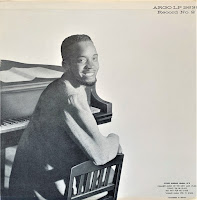Ahmad Jamal – Extensions
Released 1965
Recording and Session Information
Ahmad Jamal, piano; Jamil S. Nasser, bass; Vernel Fournier, drums
Nola's Penthouse Studios, New York, May 18-20 1965
13961 This terrible planet
13962 Dance to the lady
13963 Bogaloo (?) (unissued)
13964 Whisper not
13965 Extensions (pt 1)
13966 Who can I turn to? (unissued)
13967 The first love song (unissued)
13968 unknown title (unissued)
13969 Look at that face (unissued)
Track Listing
| Extensions | Ahmad Jamal | May 18-20 1965 |
| Dance To The Lady | John Handy | May 18-20 1965 |
| This Terrible Planet | Bob Williams | May 18-20 1965 |
| Whisper Not | Benny Golson | May 18-20 1965 |
Liner Notes
IT IS always delightful exposing oneself to Ahmad Jamal's talents because he posesses all of the ingredients of 'the real jazz musician'. Innate ability varies in people but this man has been given an infectious swing, a wide harmonic scope, and a love for beautiful melodies.Until a couple of years ago, he often said. "I haven't had a lesson in fifteen years: I was playing this way when I was twenty!" In his native Pittsburgh, and later while working Chicago night spots, his exceptional gifts were recognized, hut we have to differ with Jamal — he's playing greater than ever! This album is a testimony to that, sanctioned by the extremely capable bassist, Jamil S. Nasser, and the superb drummer, Vernei Fournier. Jamal's preference for the trio has persisted for sixteen years and this seems to be an ideal choice.
From "Wanted...Peace," one of Bob Williams' musicals, comes THIS TERRIFLE PLANET. A rhythmic combination of tambourin, sock cymbal, and side tom helps set the pace of this F-minor medium offering with a bluesy-eastern flavor.
Ahmad says, "THIS TERRIBLE PLANET is a most interesting composition and the words are equally interesting. I'm looking forward to people like Johnny Hartman doing it."
The runs of John Handy's DANCE TO THE LADY advance ripples of feeling. A&R man Dave Usher, highly excited in the control booth, is prompted to tell Ahmad after the take. "Yea! The lady dances with us!"
"DANCE TO THE LADY is a pretty tune," says Ahmad. "I dig it! Written by one of the most talented and scholarly musicians today, John Handy. He holds a masters degree and lives in San Francisco. A person, in musician circles, is very unfortunate who hasn't discovered him, very unfortunate!"
Benny Golson's WHISPER NOT is in the 'groovy modern tradition'. A fiery flavor is given underneath the beat by Vernel's fantastic top cymbal work.
Ahmad reminisces, "WHISPER NOT is such a swinger! A tune I've been doing for some time. Wrinen by one of my favorite musicians who has the rare facility of being a fine writer and instrutnentalist. When he was with Earl Bostic, he used to come to the Pershing. This is one of many of his compositions I enjoy."
After an ensemble intro, we go into the only original, EXTENSIONS. Then comes a bass solo, then one by Fournier, then Ahmad surprises us by tastefully plucking the piano strings. Following is a series of exchanges and then an up-tempo demon-like swing: a sort of intellectual adventure. a variety of interesting rhythms.
Ahmad considers EXTENSIONS to be the most important tune in the album and it has occupied his thoughts considerably: "This is a flag-waver even time we perform it. Wc did it with the Cleveland Orchestra on July 28, 1965. This is definitely 'thinking' music. Ever since we starred doing EXTENSIONS it hasn't failed to overwhelm the audience to the point of standing ovations."
Vernel Fournier has experienced two jazz history-making cities and perhaps this has contributed to his more than adequate percussion endowment and made him an expert. He was born in New Orleans and migrated to Chicago at twenty. A recording studio technician says. "He plays so politely!" Fournier rides his top cymbal brilliantly and with accompanying accents, using sock, brass, snare and tom — a soloist can't helped being moved. A brief spell away from the trio caused him to say on returning, "It's good to be back. I missed Ahmad!"
Vernel says. "THIS TERRIBLE PLANET is some title! It has a beautiful African sound. I play 3/4 and 4/4 time, Jamil 3/4, and Ahmad 3/4. DANCE TO THE LADY has a beautiful melody," Vernel continues, "I love this one! I like WHISPER NOT's beat. Going to listen carefully to the playback. Yea, " Vernel amens, "this EXTENSIONS really gives me a fast up-there challenge!"
Jamil S. Nasser is also from a city with a jazz tradition, Memphis. He allied himself to the bass in 1948 and, now being one of the prominent men on that instrument in New York, shows that this alliance wasn't fruitless. Of significance, however, is the pleasure of hearing his power, steady beat, and fertile rhythmic imagination.
Jamil says. "I love THIS TERRIBLE PLANET and sinking into the rhythm like an anchor. This I call 'anchoring'. DANCE TO THE LADY is unusual, musical, and written by a helluva musician! Love the tune! I get a swingin' kick out of WHISPER NOT." (Nasser danced happily on the playback of this one.) "We really get a good tempo on EXTENSIONS."
Watching Ahmad during a break flipping the pages of a Bach two- and three-part inventions, one thinks — or could think — of the journey trekked by him to the top: it's miraculous! But greatness cannot be harnessed by obstacles or disadvantages — this record is the proof.
And now allow me to present Ahmad Jamal's EXTENSIONS...
—Ahmad Basheer
Off The Record































